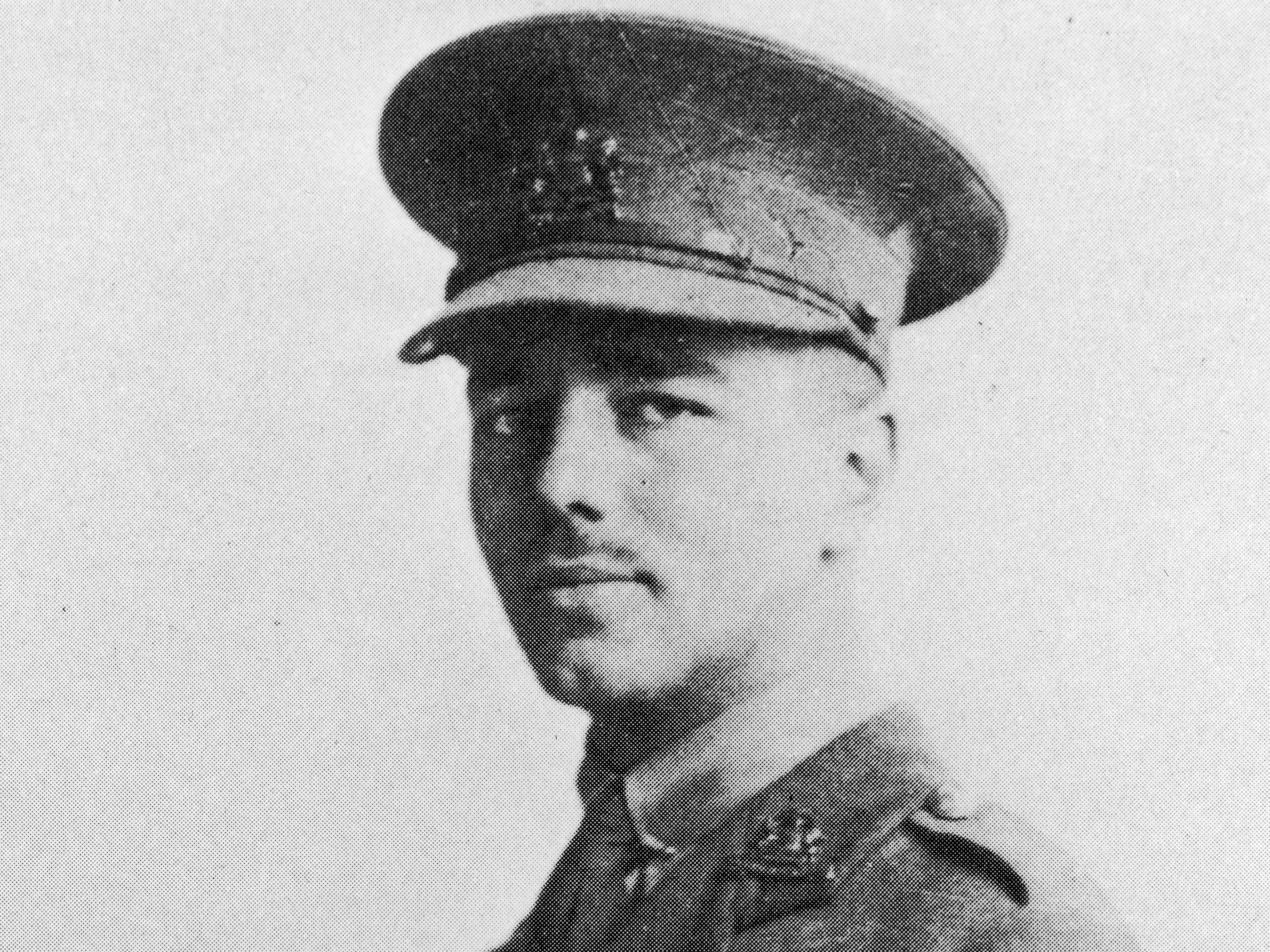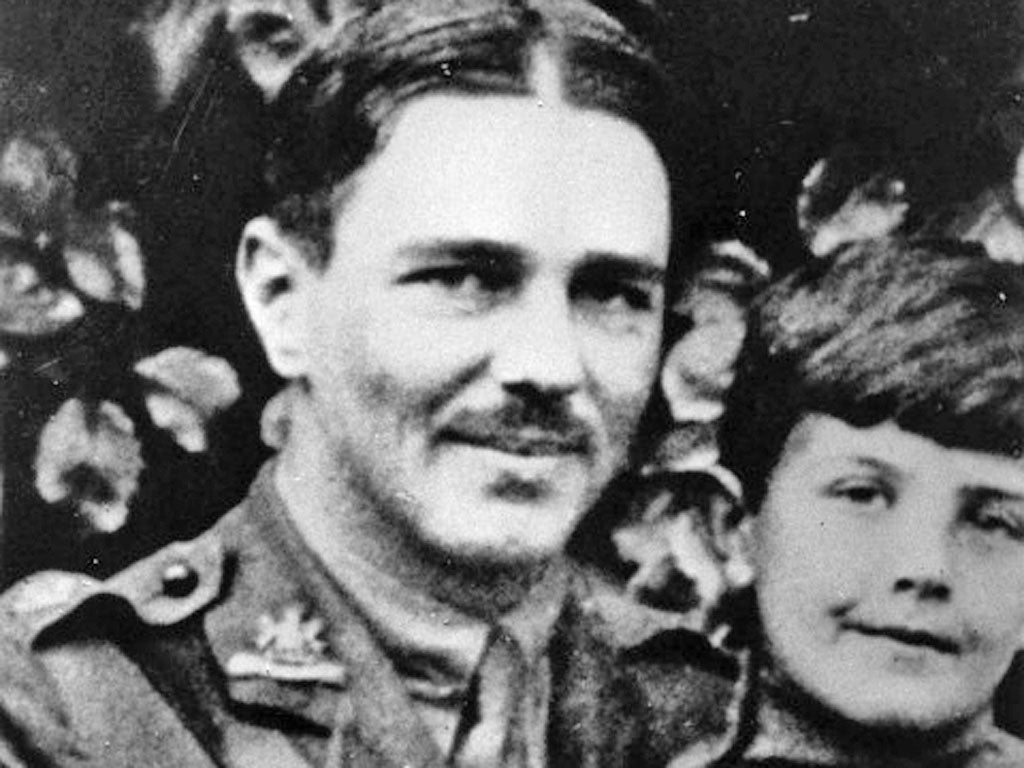Wilfred Owen at 100: The celebrated First World War poet's five finest compositions
Writer killed in action a week before Armistice Day lives on through verse expressing brutal realities of combat in unflinching detail

Your support helps us to tell the story
From reproductive rights to climate change to Big Tech, The Independent is on the ground when the story is developing. Whether it's investigating the financials of Elon Musk's pro-Trump PAC or producing our latest documentary, 'The A Word', which shines a light on the American women fighting for reproductive rights, we know how important it is to parse out the facts from the messaging.
At such a critical moment in US history, we need reporters on the ground. Your donation allows us to keep sending journalists to speak to both sides of the story.
The Independent is trusted by Americans across the entire political spectrum. And unlike many other quality news outlets, we choose not to lock Americans out of our reporting and analysis with paywalls. We believe quality journalism should be available to everyone, paid for by those who can afford it.
Your support makes all the difference.Wilfred Owen, the great British war poet, died a century ago this weekend.
The second lieutenant was killed in action as he led a raiding party across the Sambre-Oise Canal in northern France on 4 November 1918, just a week before the Armistice was signed and the First World War brought to a close. His mother received the news by telegram on Armistice Day as the church bells of Shrewsbury rang out in celebration of victory.
Like John Keats before him – a poet the young Owen greatly admired and whose Hampstead house he made a pilgrimage to – Owen was just 25 when he met his end, the extent of his achievement all the more extraordinary given the brevity of his time on earth.
Born on 18 March 1893 in Oswestry, Shropshire, Wilfred Owen was raised in Birkenhead on the Wirral after his father Thomas was appointed stationmaster to the Woodside terminus.
Wilfred and his three siblings roamed the countryside around Broxton as children, his brother Harold later citing the landscape as a key inspiration. Early works like “Written in a Wood, September 1910”, reflecting on the majesty of an ancient beech tree, point to his wonder in nature and early infatuation with the Lake Poets.
A devout young man raised among evangelical Anglicans, at 18 Owen accepted a post as a lay assistant to the vicar of Dunsden in the Thames Valley. His mother hoped the move would lead to his joining the clergy. Quickly tiring of the sedate life of the village green and botany lessons at the University of Reading, Owen instead left for France to teach English at the Berlitz School of Languages in Bordeaux in 1912.
With the outbreak of war, he eventually returned and enlisted in the British Army in 1915, commissioned into the Manchester Regiment. After completing basic training in Essex, he arrived at the front in January 1917.

His gentle early life of the hills, the classroom and the chapel had not prepared him for the rough existence of a soldier or the horror of mechanised warfare. The carnage he encountered left him traumatised. After being blown up by a trench mortar and suffering concussion, he was diagnosed with shell shock and dispatched to the Craiglockhart War Hospital near Edinburgh.
It was while receiving psychiatric care that Wilfred Owen encountered Siegfried Sassoon, who sympathised with the anti-war sentiments the younger man expressed and encouraged his verse, urging him to “sweat your guts out for poetry!” Sassoon’s support provided the spark Owen needed.
After spending a winter recuperating in Scarborough, he ignored Sassoon’s advice and returned to combat in late August 1918, never to return. The body of work he left behind, however, stands for the ages.
The poems for which Wilfred Owen is remembered capture the death and destruction of the battlefield in unflinching detail, his graphic reportage of bootless soldiers trudging exhausted through mud, choking on mustard gas and dying for nothing tangled in briars of barbed wire making a nonsense of the customary patriotic tub-thumping about duty and heroism.
An anthology of his verse, collected and edited by Sassoon, was published in 1920 and – like the paintings of John Nash – would bring the realities of conflict home to the public, forever colouring the way we think about military endeavour.
In honour of Wilfred Owen on his centenary, here is a brief introduction to five of his most admired poems.
Dulce et Decorum Est
Perhaps the most famous of all war poems, here Owen openly questions the Roman poet Horace’s assertion of the title: “It is sweet and proper to die for one’s country.”
Written in plain language, readily comprehensible to ordinary soldiers, Owen’s verse characterises his fellow infantrymen “coughing like hags” and “Drunk with fatigue” as they trudge onwards, asleep on their feet.
When they are struck by “the hoots of gas-shells dropping” and find themselves drowning in a green mist of poison, the writer is unsparingly graphic:
“If you could hear, at every jolt, the blood
“Come gargling from the froth-corrupted lungs,
“Obscene as cancer, bitter as the cud
“Of vile, incurable sores on innocent tongues,
“My friend, you would not tell with such high zest
“To children ardent for some desperate glory,
“The old Lie: Dulce et decorum est
“Pro patria mori.”
Anthem for Doomed Youth
Owen here focuses on the sheer brutality of the slaughter, finding no romance in the fate of men “who die as cattle” having been summoned to their inevitable end by “bugles calling for them from sad shires”.
Denied the ceremonial niceties of mourning rituals, the “doomed youth” can expect only the mock sorrows of “shrill, demented choirs of wailing shells”.
The onomatopoeic burst of the phrase “stuttering rifles’ rapid rattle” illustrates the craft of the man.
Strange Meeting
Again drawing on antiquity, Owen imagines a descent down, down through a foxhole into Hell itself.
There the narrator encounters a corpse who reflects on his life, “the truth untold,/The pity of war” and the legacy of their sacrifice before the haunting revelation:
“I am the enemy you killed, my friend.
I knew you in this dark: for so you frowned
Yesterday through me as you jabbed and killed.
I parried; but my hands were loath and cold.
Let us sleep now...”
“Strange Meeting” concludes Benjamin Britten’s War Requiem, composed for the consecration of Coventry Cathedral in 1962.
Spring Offensive
Repurposing his early taste for nature poetry to chillingly ironic effect, Owen opens by describing the emerging abundance of spring in Keatsian fashion:
“Marvelling they stood, and watched the long grass swirled
“By the May breeze, murmurous with wasp and midge.”
As soldiers’ boots stomp through buttercups, the poet breaks off to describe the sudden eruption of violence (“instantly the whole sky burned”) subverting the innocence of the preceding image: “And soft sudden cups/Opened in thousands for their blood”.
For Owen, the natural world is indifferent to the affairs of men, the earth resilient and ready to endure and outlast the worst humanity can afflict upon it and each other, its beauty simultaneously providing an uneasy contrast to the industrialised bloodshed.
Insensibility
The poet’s own experiences of shell shock made him uniquely qualified to address a condition we now recognise as post-traumatic stress disorder.
The narrator muses on the consoling oblivion of the condition: “Happy are these who lose imagination.” The phrase echoes the state of “drowsy numbness” Keats articulates in “Ode on a Nightingale” (1819).
Wilfred Owen speaks for the men fallen at his side and for millions since when he writes:
“And some cease feeling
“Even themselves or for themselves.
“Dullness best solves
“The tease and doubt of shelling.”
Join our commenting forum
Join thought-provoking conversations, follow other Independent readers and see their replies
Comments